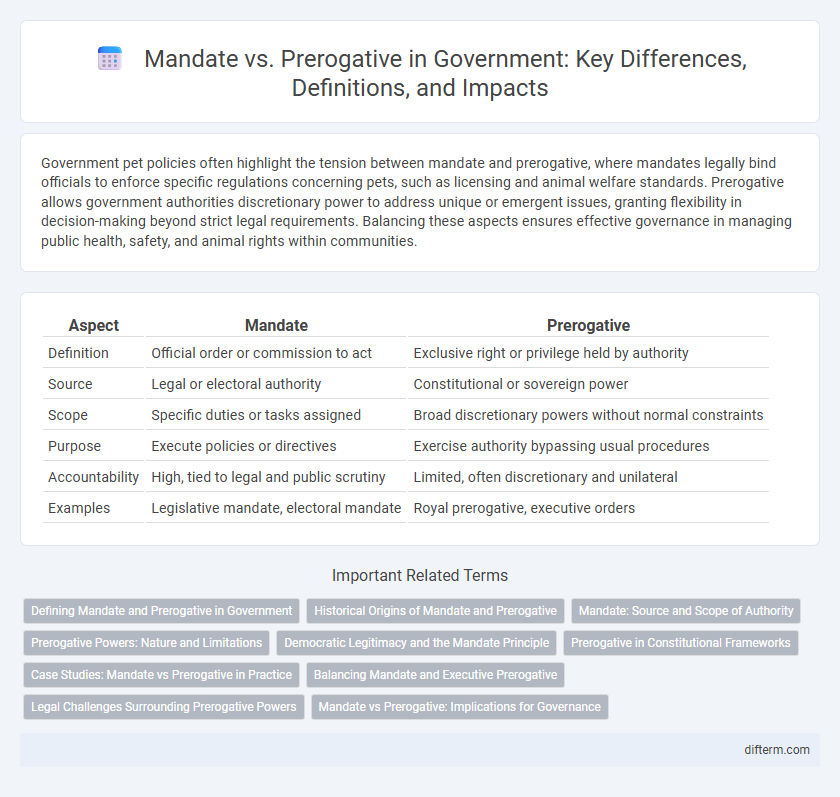Government pet policies often highlight the tension between mandate and prerogative, where mandates legally bind officials to enforce specific regulations concerning pets, such as licensing and animal welfare standards. Prerogative allows government authorities discretionary power to address unique or emergent issues, granting flexibility in decision-making beyond strict legal requirements. Balancing these aspects ensures effective governance in managing public health, safety, and animal rights within communities.
Table of Comparison
| Aspect | Mandate | Prerogative |
|---|---|---|
| Definition | Official order or commission to act | Exclusive right or privilege held by authority |
| Source | Legal or electoral authority | Constitutional or sovereign power |
| Scope | Specific duties or tasks assigned | Broad discretionary powers without normal constraints |
| Purpose | Execute policies or directives | Exercise authority bypassing usual procedures |
| Accountability | High, tied to legal and public scrutiny | Limited, often discretionary and unilateral |
| Examples | Legislative mandate, electoral mandate | Royal prerogative, executive orders |
Defining Mandate and Prerogative in Government
A mandate in government refers to the authority granted by an electorate to elected officials to implement specific policies or actions as outlined during their campaign or election. Prerogative, conversely, denotes the discretionary powers or privileges uniquely held by a government executive, such as a president or monarch, allowing them to act independently of legislative approval in certain situations. Understanding the distinction between a mandate's democratic legitimacy and a prerogative's unilateral authority is essential for analyzing executive power and governance.
Historical Origins of Mandate and Prerogative
The historical origins of mandate trace back to formal authorizations granted by sovereign powers, often codified in legal frameworks to delegate authority to officials or institutions. Prerogative emerged from monarchical privileges allowing rulers discretionary powers beyond statutory law, rooted in ancient royal customs and sovereign rights. Understanding these origins highlights the evolution of government authority from absolute monarchy to structured governance based on legal mandates and limited prerogatives.
Mandate: Source and Scope of Authority
A government mandate derives its authority from constitutional or legislative enactments that explicitly grant power to execute specific policies or actions. The scope of a mandate is clearly defined, outlining the limits and responsibilities entrusted to public officials or institutions. Mandates ensure accountability by providing a formal legal basis for decision-making within the framework of governance.
Prerogative Powers: Nature and Limitations
Prerogative powers refer to executive authorities historically vested in the sovereign but now exercised by government officials without explicit legislation. These powers enable swift decision-making in areas such as foreign affairs, defense, and emergency responses, yet they face legal and constitutional limitations to prevent misuse and ensure accountability. Courts often intervene when prerogative powers infringe on individual rights or exceed established constitutional boundaries, maintaining a balance between executive discretion and democratic oversight.
Democratic Legitimacy and the Mandate Principle
Mandate refers to the explicit authorization granted by the electorate to elected officials, forming the foundation of democratic legitimacy and ensuring that government actions reflect the collective will. Prerogative denotes the discretionary powers exercised by government authorities, often rooted in constitutional conventions rather than explicit electoral endorsement. The mandate principle underscores that democratic legitimacy is chiefly derived from the electorate's clear mandate, limiting the scope of prerogative powers when they conflict with the expressed public mandate.
Prerogative in Constitutional Frameworks
Prerogative powers in constitutional frameworks refer to the discretionary authorities granted to executive branches or monarchs, allowing actions without prior legislative consent. These powers often include issuing pardons, conducting foreign affairs, and deploying armed forces, functioning as essential tools for swift governance. Unlike mandates derived from electoral or legislative processes, prerogatives operate within a legal tradition but may face limitations imposed by courts or statutory laws to prevent executive overreach.
Case Studies: Mandate vs Prerogative in Practice
Case studies of mandate versus prerogative reveal how governments balance explicit public authorization with executive discretion in decision-making. For example, the U.S. Supreme Court's ruling in Youngstown Sheet & Tube Co. v. Sawyer limited presidential prerogative by emphasizing congressional mandates during national emergencies. Similarly, the UK's prorogation controversy in 2019 highlighted tensions between Prime Ministerial prerogatives and parliamentary mandates, illustrating the practical challenges in delineating authority.
Balancing Mandate and Executive Prerogative
Balancing mandate and executive prerogative requires aligning the elected authority's explicit policy directives with the discretionary powers needed for effective governance. Maintaining this balance ensures that government actions reflect the electorate's will while allowing flexibility to address unforeseen challenges and national interests. Proper checks and institutional frameworks are essential to prevent abuse of prerogative powers and uphold democratic accountability.
Legal Challenges Surrounding Prerogative Powers
Prerogative powers, historically vested in the executive branch, face increasing legal challenges due to their broad and often ambiguous scope, which can conflict with statutory laws and judicial oversight. Courts frequently scrutinize these powers to ensure they do not contravene constitutional principles or undermine parliamentary sovereignty. Legal disputes surrounding prerogative powers highlight the tension between traditional executive authority and contemporary demands for transparency and accountability in government operations.
Mandate vs Prerogative: Implications for Governance
Mandate refers to the explicit authority granted to government officials through elections or legal instruments, ensuring accountability and legitimacy in decision-making processes. Prerogative denotes the discretionary powers exercised by executives, often bypassing formal legislative approval to address urgent or exceptional circumstances. The balance between mandate and prerogative significantly impacts governance by shaping the scope of authority, the checks and balances in place, and the responsiveness of government to public needs and constitutional limits.
Mandate vs Prerogative Infographic

 difterm.com
difterm.com